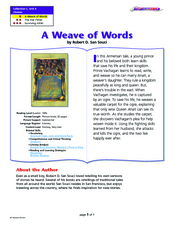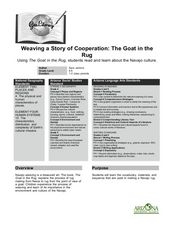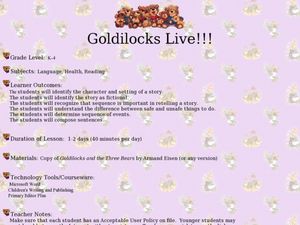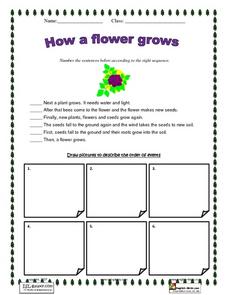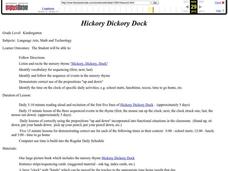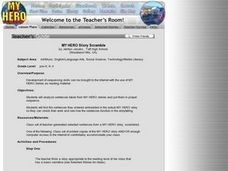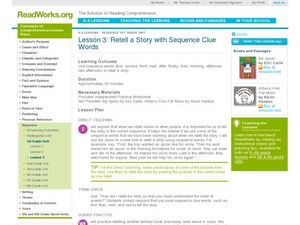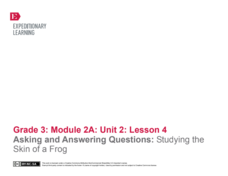August House
Why Koala Has a Stumpy Tail
Learn about the animals of Australia with a language arts lesson about an Australian folktale called, Why Koala Has a Stumpy Tail. After reading the story as a class, kids discuss events and characters from the book, retell the...
Curated OER
One * Two * Three * Story
Second graders explore sequencing by drawing events of a story in order. In this sequence of events lesson, 2nd graders are read a story such as "The 3 Little Pigs", they recall the events from the fairy tale in order, visit an...
Alabama Learning Exchange
The Grouchy Ladybug
Students listen to the book, "The Grouchy Ladybug" by Eric Carle and sequence the events in the story. Using a graph, they draw and color the animals that the ladybug meets next to the corresponding time from the story, and conduct...
Curated OER
Lesson Plan 17: Novel, Take 2
It's all about using peer resources in this writing process activity, which includes a fantastic novel revision worksheet packet. Learners have read a partner's story draft the night before, and groups have a "lightning round of...
Curated OER
A Weave of Woods
Focus on vocabulary, comprehension, and analysis while reading A Weave of Woods, a colorful picture book by Robert D. San Souci. Young learners use worksheets to preview, predict, practice paraphrasing, and make comparisons. The...
Curated OER
Weaving a Story of Cooperation: The Goat in the Rug
Weaving is an important part of Navajo culture. Read The Goat in the Rug to your fourth and fifth graders, and give them a glimpse into the process of rug making from the point of view of a goat! They will learn new vocabulary words and...
Curated OER
Maus: Making a Visual Representation
How do you represent a tragic event? Are stories of tragic events better left untold? After reading chapter two of Maus and studying other representations of the Holocaust (suggestions are included), class members create a representation...
Curated OER
Goldilocks Live!!!
Study story elements with your young learners. Read Goldilocks and the Three Bears and discuss the order of events by making a story panel out of butcher paper. Sentences are given as suggestions for the panel, though you may...
Curated OER
The Hat
Honing reading and communication skills through the theme of farm animals is the focus of this lesson. Students read a book about Scandinavian farm animals and complete prediction journal activities. They complete a worksheet about the...
Curated OER
Berlioz the Bear
Young children read the story, Berlioz the Bear and complete various reading and writing activities. They learn about fiction and non-fiction, and complete graphing and writing activities for the story. Youngsters draw the bear and use...
Curated OER
How a Flower Grows
English Language Learners demonstrate their ability to sequence the steps in a process. After reading six sentences that describe how a flower grows, learners identify the right sequence and illustrate the steps. An answer key is provided.
Curated OER
Hickory Dickory Dock
Students use the Hickory Dickory Dock nursery rhyme to learn about rhyme, telling time, and preposition use. In this nursery rhyme instructional activity, students read the nursery rhyme daily and complete a Mother Goose quiz. Students...
Curated OER
My Hero Story Scramble
Use websites to read stories about heroes. The "My Hero" website provides skills and reading materials to help your class analyze sequence and story parts. They put the events in order to show the correct sequence of events.
Curated OER
Body Sequencing
Fifth graders listen to a story told by their teacher. They have cards of all of the events in the story. They must "jump" into the correct order of events.
Curated OER
Sequence of Events Storyline
Seventh graders practice sequencing the events in a story they have read. After reading a short story, 7th graders sequence the events of the story using a timeline. Their timeline is used to create a summary paragraph of the story...
Curated OER
Read All About It! California History of the 30s and 40s
Explore the Great Depression! Discover the challenges people experienced during the time period. Learners investigate photographs from the Dust Bowl and WWII era and create a story line about the photographs, writing a newspaper article...
Curated OER
Friendly Neighbors
Students identify the sequence of events in a text. In this literacy activity, students read the book Miss Tizzy and sequence the events from the text. Students reflect and write about the philanthropic acts in the book.
Curated OER
Lesson 3: Retell a Story with Sequence Clue Words
First graders evaluate sequence words. In this order of events lesson, 1st graders practice using sequence words to retell a story. They do guided practice with the teacher retelling a story they have read as a class and then try it...
Curated OER
Sequence of a Story within a Story
Fourth graders read a story. In this story sequencing instructional activity, 4th graders learn about the use of flashbacks in a story. Students read Tell Me a Story, Mama and identify flashbacks in the story.
Curated OER
Dusty Locks and the Three Bears
Read this twist on Goldilocks and the Three Bears: Dusty Locks and the Three Bears by Susan Lowell. Kindergartners listen, predict, and discuss the story. They then participate in a dramatization of the story and draw a picture...
Curated OER
Parts of the Plot: Constructing A Plot Diagram
After reading "The King of Mazy May" by Jack London, learners reinforce their literary analysis skills in this SMART board lesson. The provided SMART board file allows themto define elements of a short story, and then add it to the plot...
Curated OER
Left-to-Right Reading
Left-to-right, left-to-right, that's the way we read and write! Watch this short video clip and teach your young learners this chant before they start writing!
EngageNY
Asking and Answering Questions: Studying the Skin of a Frog
English language arts and science combine in a lesson that focuses on asking and answering questions about frog skin. Discussion, a read-aloud, and partner work lead the way towards a three-page worksheet that tests learners'...
EngageNY
Grade 9 ELA Module 3, Unit 1, Lesson 5
Ninth graders study the study of animals in an informational text lesson plan that focuses on analyzing text structure. As learners continue reading the first chapter of Temple Grandin's Animals in Translation, they form inquiries and...




